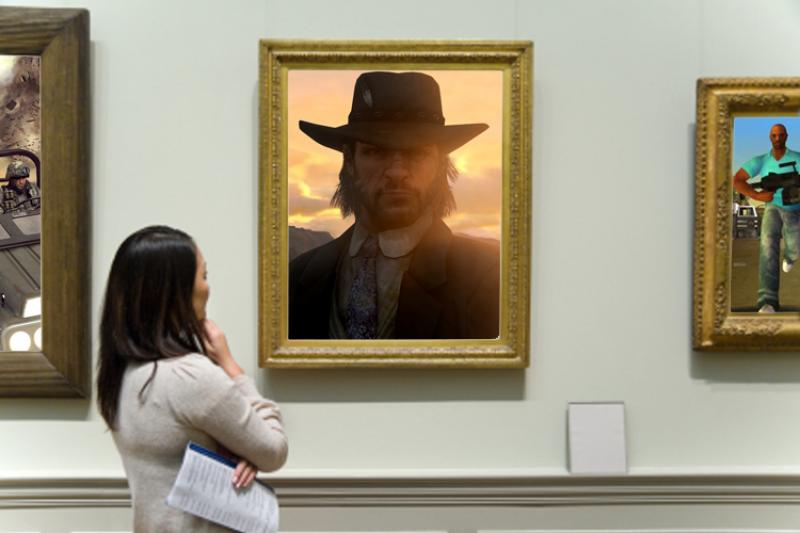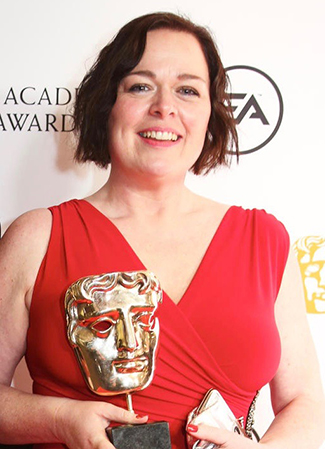h Club 100 Awards: Video games - you've come a long way, baby | reviews, news & interviews
h.Club 100 Awards: Video games - you've come a long way, baby
h.Club 100 Awards: Video games - you've come a long way, baby
From hit shows on Classic FM to bestselling novels, the influence of videogames stretches far beyond the confines of the screen

In a recent review on theartsdesk, Stuart Houghton did a thoroughly surgical job of dissecting the ancient argument that video games could never be art, by serving up 10 perfect examples to the contrary.
Videogames have not only cemented their position as a major revenue generator (£4 billion in the UK last year) but cross-pollinated with other art forms to the extent that they serve as the both the backdrop and the subject of popular novels and orchestral music.
 When daytime TV darlings Richard and Judy waxed lyrical about author Keith Stuart (pictured right) and his debut novel A Boy Made of Blocks, a story of a father’s struggle to connect with his autistic son, they were struck by the warmth and tenderness of the work. Judy went on to say, “But waiting quietly in the wings was a way to connect father and son, courtesy of the age of information technology (IT): a virtual language that the child and adult might share.”
When daytime TV darlings Richard and Judy waxed lyrical about author Keith Stuart (pictured right) and his debut novel A Boy Made of Blocks, a story of a father’s struggle to connect with his autistic son, they were struck by the warmth and tenderness of the work. Judy went on to say, “But waiting quietly in the wings was a way to connect father and son, courtesy of the age of information technology (IT): a virtual language that the child and adult might share.”
What she was describing, apart from the twee reference to IT, was Minecraft, the gaming cultural phenomenon and a cleverly used plot device that acts as both the backdrop and conduit for the relationship to develop between the story’s protagonist and his offspring.
Richard and Judy went on to make the novel their title for The Spring Book Club, which did what all Richard and Judy recommendations do: propel the book to the Amazon bestseller list.
A betting man would put a wager on a film being in the offing. Not bad for a games journalist who has spent much of his life writing about games and gaming culture (Stuart is games editor for the Guardian). But then Stuart knows by nature that games often represent so much more than throw-away entertainment.
Let’s leave books for the moment and turn the radio on. The most popular show on Classic FM catch-up is High Score, a six-part series about video game music, presented by Jessica Curry, an internationally acclaimed BAFTA-winning composer. Curry also knows a thing or two about music and games, having written the score for Everyone’s Gone to the Rapture, one of the standout PS4 hits of 2015. Curry’s videogames compositions have been played from the Sydney Opera House to the Barbican Centre.
 The Brighton-based composer (pictured left) concedes that there remains some snobbery from the classical music world regarding videogame scores; but compares it to a similar opinion the "old guard" held regarding film soundtracks, a prejudice that now seems ridiculous.
The Brighton-based composer (pictured left) concedes that there remains some snobbery from the classical music world regarding videogame scores; but compares it to a similar opinion the "old guard" held regarding film soundtracks, a prejudice that now seems ridiculous.
The Classic FM audience numbers would attest to the popularity of High Score, a show where listeners can enjoy the contrast of the epic and intimate as demonstrated by Clint Mansell’s Mass Effect 3 score. Or the sparse, haunting soundtrack to The Last of Us by double Oscar winner Gustavo Santaolalla.
Jessica Curry and Keith Stuart are two of the 10 names on the nominee shortlist in the games category for the h.Club 100 Awards. The rest of the list, ranging from e-sports to virtual reality via charity work and innovative designers, is bristling with talent and diversity.
You can have your say by casting a vote for who you think should be recognised for their achievements in the industry. An industry that hasn’t just been accepted by the mainstream, but conquered it.
Explore topics
Share this article
The future of Arts Journalism
You can stop theartsdesk.com closing!
We urgently need financing to survive. Our fundraising drive has thus far raised £49,000 but we need to reach £100,000 or we will be forced to close. Please contribute here: https://gofund.me/c3f6033d
And if you can forward this information to anyone who might assist, we’d be grateful.

Subscribe to theartsdesk.com
Thank you for continuing to read our work on theartsdesk.com. For unlimited access to every article in its entirety, including our archive of more than 15,000 pieces, we're asking for £5 per month or £40 per year. We feel it's a very good deal, and hope you do too.
To take a subscription now simply click here.
And if you're looking for that extra gift for a friend or family member, why not treat them to a theartsdesk.com gift subscription?
more Gaming
 'We are bowled over!' Thank you for your messages of love and support
Much-appreciated words of commendation from readers and the cultural community
'We are bowled over!' Thank you for your messages of love and support
Much-appreciated words of commendation from readers and the cultural community
 Kelly Clancy: Playing with Reality - How Games Shape Our World review - how far games go back
The acclaimed neuroscientist on the world and history of games, in all their variety
Kelly Clancy: Playing with Reality - How Games Shape Our World review - how far games go back
The acclaimed neuroscientist on the world and history of games, in all their variety
 Rage 2 review – garish but great post-apocalyptic shooter
Challenge The Authority in this 'Mad Max on mushrooms' renegade romp
Rage 2 review – garish but great post-apocalyptic shooter
Challenge The Authority in this 'Mad Max on mushrooms' renegade romp
 World War Z review - bloodthirsty fun with the zombie apocalypse
Chainsawing the brain-eaters as you battle against the tide of the undead
World War Z review - bloodthirsty fun with the zombie apocalypse
Chainsawing the brain-eaters as you battle against the tide of the undead
 The Lego Movie 2 Videogame review - everything is not awesome
Few fresh ideas means this movie adaptation treads the same old ground
The Lego Movie 2 Videogame review - everything is not awesome
Few fresh ideas means this movie adaptation treads the same old ground
 Anthem review - singing praises? More like a cautious nod
A rocky start for a new franchise that offers potential and problems in equal measure
Anthem review - singing praises? More like a cautious nod
A rocky start for a new franchise that offers potential and problems in equal measure
 Crackdown 3 review - spectacular super-powered action that was great fun many years ago
Nearly a decade has passed since the last incarnation but little has changed in this stagnant shooter
Crackdown 3 review - spectacular super-powered action that was great fun many years ago
Nearly a decade has passed since the last incarnation but little has changed in this stagnant shooter
 Battlefield V review - WWII on an epic scale
The veteran series returns for another ambitious tour of duty
Battlefield V review - WWII on an epic scale
The veteran series returns for another ambitious tour of duty
 Fallout 76 review - how to wreck a perfectly good legacy with one messy game
When home runs go horribly wrong
Fallout 76 review - how to wreck a perfectly good legacy with one messy game
When home runs go horribly wrong
 Red Dead Redemption 2 review - the cowboy drama makes a triumphant return
An ambitious Wild West odyssey that matches epic scale with benchmark skill
Red Dead Redemption 2 review - the cowboy drama makes a triumphant return
An ambitious Wild West odyssey that matches epic scale with benchmark skill
 Call of Duty: Black Ops 4 review – less is more
Solo rations have been relegated from this benchmark war series
Call of Duty: Black Ops 4 review – less is more
Solo rations have been relegated from this benchmark war series
 FIFA 19 review - the best just got a bit better
It looks and plays great, but what’s new?
FIFA 19 review - the best just got a bit better
It looks and plays great, but what’s new?

Add comment